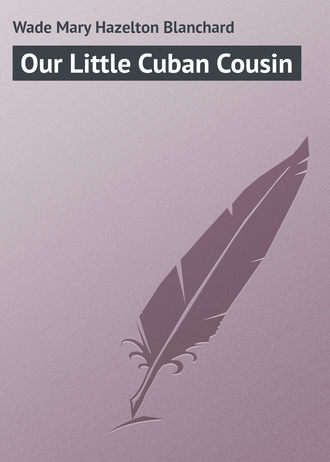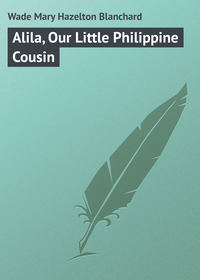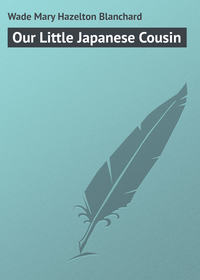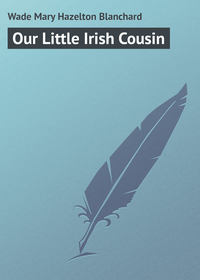 полная версия
полная версияOur Little Cuban Cousin
At the far end of the fortress was a tall lighthouse. It stood like a sentinel to stand watch against possible danger. Once upon a time a wall reached from the great fort in both directions around the city of Havana. But now there was scarcely a trace of it left.
"How narrow and dirty the streets are," said Maria as they left the Morro. "I must say I would rather live in the country, if I could choose for myself."
"It doesn't matter so much about the width of the streets," said Blanco, "or the poor sidewalks, either. Because, you know, we almost always ride. The working people are the ones who walk. But I do not like the dirt. That is all the fault of the Spaniards. They taxed us enough, but they kept the money for themselves.
"Last summer I was very sick with yellow fever. Mother thought I would not get well. She said she believed we had so much of this dreadful disease because the city is allowed to be so unclean.
"But look quickly at that Punch and Judy show! Let's stop and watch it. There is a man playing the harp to make it more entertaining."
The children leaned out of the carriage to see the show. Isabella had never seen Punch and Judy before, and she was greatly delighted. In a few minutes they moved on, but soon stopped again, for here stood a man turning a hand-organ with a monkey beside him dressed in a most ridiculous little suit of clothes. The monkey was dancing to the music. Suddenly he gave a spring and landed in the carriage right in Maria's lap.
Off came the monkey's cap into his little hands, and with the most solemn look it was held up to each of the children in turn.
"Take that, you poor little beggar," said Ramon as he put a silver coin into the cap. Down jumped the monkey and off he scampered to his master.
There were many odd sights for the little country cousins. Among them were Chinese peddlers showing the pretty ornaments which had been brought across the ocean. Once the children passed a cow that was being led home after her morning's work. She had gone with her master from house to house, stopping long enough at each place for her to give as much milk as the people wished.
The cow was followed by a man leading a long train of mules. They were laden with empty baskets. They, too, were going home, as they had left their loads at the markets in the city.
The sun was quite hot and the party hurried home to rest during the noon hours, for, of course, every one took a nap at this time of the day. They might not all lie down; perhaps some of those who had stores in the busy part of the city would not leave their places of business; they might only lean back and doze in their chairs; but they would certainly keep quiet and close their eyes, if nothing more. It made one think of the story of the "Sleeping Beauty" to see Havana at twelve o'clock, noon, in the summer season.
As for Maria, the dainty maiden quite enjoyed her rest at the great city house. She could lie very comfortably in a hammock while a little negro girl kept off the flies and mosquitoes with a big fan. She needed the nap in the city more than at home because she was awakened so early by the bells.
Perhaps the children enjoyed Sunday more than any other day during their stay in the city, for it was then that they visited the cathedral containing the tomb of Columbus. There were many churches and grand buildings in Havana, but none could interest the children like this.
It was not very far from the house, but they all went in the carriage, carrying with them the mats to kneel on during the service. It was a grand old stone building, overgrown with moss. There were many bells in the two high towers. They were pealing loudly as the party drove up.
"Just think how old it is," whispered Maria to her brother as they entered the building. "Blanco says that some of the bells were brought from Spain more than two hundred years ago. Do look at the beautiful marble pillars, Isabella. Isn't it a grand place?"
It was not yet time for the service to begin, so Blanco led the children to the tomb of Columbus, where his ashes had rested for so many years. It was at the right of the high altar. All that could be seen was a marble tablet about seven feet square. Above it stood a bust of the great discoverer.
"They say that Spain has asked the right to have the ashes, and America is going to let her take them. But we shall still have the tomb and the grand old cathedral where they have rested so long," said Blanco.
"Now come and admire the altar."
It stood on pillars of porphyry and was fairly covered with candlesticks, images, and gaudy decorations. Somehow they did not go well with the simple beauty of the rest of the church. But the children admired it, for they were ready to admire everything.
When the service was over, they drove out by the governor-general's palace. It was his no longer, however. The American general who had charge of the city lived here now. No doubt he enjoyed the beautiful gardens and ponds. He was very active in improving the city. Yes, the work had already begun, and in a few months Maria would no longer be able to complain of the dirt in Havana.
She could say again, but with a different thought in her busy little mind, "To-morrow is another day."
Yes, although it is but a short time since Maria's visit to Havana, even now everything is changed in the Diaz family. The good father no longer worries; he is fast getting to be a strong, healthy man. He has a fine position under the new government, and Maria lives in a new home just outside the city of Havana. She is rapidly learning to speak English, while one of her dearest friends is a little American girl who has lately made her home in Cuba.
THE END








